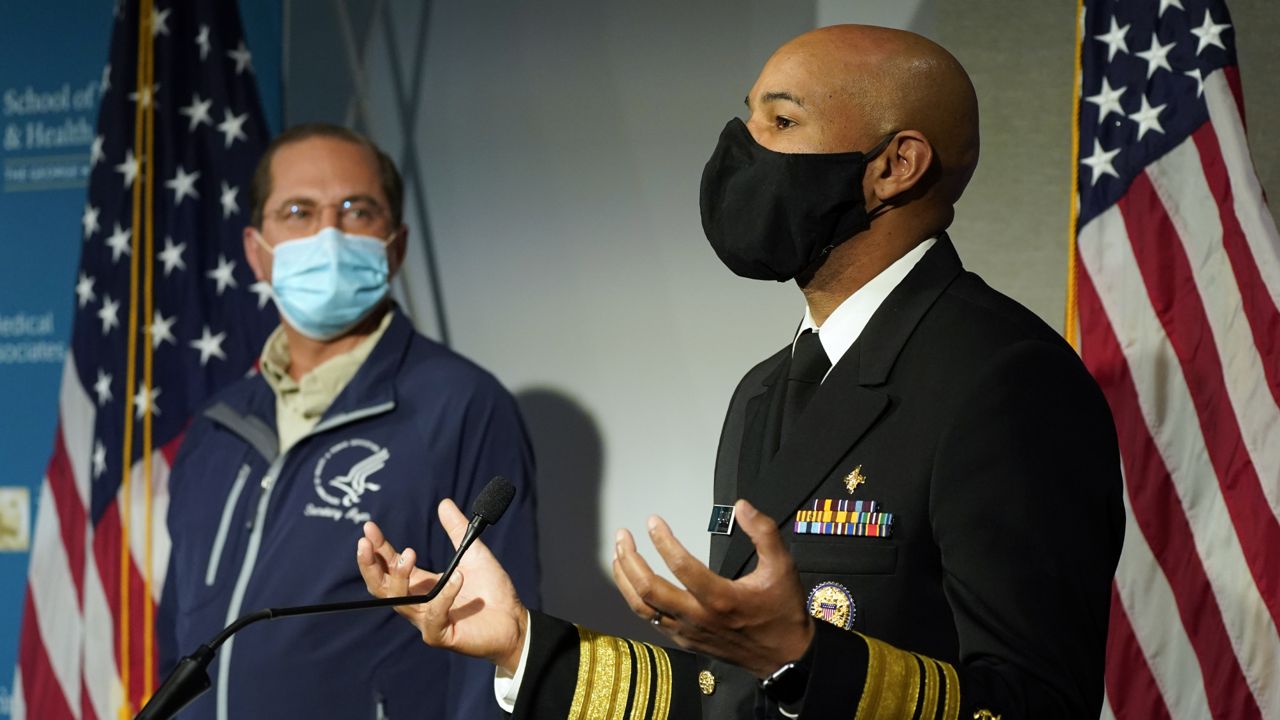Administration officials celebrated Monday as the first wave of COVID-19 vaccines were given to frontline workers across the country, but also warned that the rollout is “only the first step” in ending the ongoing coronavirus pandemic.
Health and Human Services Secretary Alex Azar and U.S. Surgeon General Jerome Adams held a ceremonial kick-off event at the George Washington University Hospital Monday afternoon, applauding the work of frontline workers before watching several hospital employees receive their first dose of the vaccine.
“Today is truly an historic day,” Adams said at the start of the press conference. “Vaccinations have been a tried and true public health measure for hundreds of years, but the development of a COVID-19 vaccine is nothing short of revolutionary and I hope everyone appreciates the importance, the significance, the history of this moment.”
Despite the celebratory nature of the event, Adams noted the vaccine will only work if Americans choose to get vaccinated.
Acknowledging that vaccines are among the “greatest social injustices in this country,” the surgeon general said it is especially important that minority communities have access to and trust in a COVID vaccine.
The coronavirus outbreak has disproportionately impacted Black, Hispanic, and Native Americans in terms of hospitalizations and deaths. Reasons are complex, but the disparities are thought to stem from minorities working in jobs on the front lines, having medical conditions associated with severe disease, higher rates of poverty, and poor access to health care.
“But — and this is an important but — having a vaccine is only the first step. We must now move from vaccines to vaccinations,” Adams said in part. “And it would be a great tragedy if disparities actually worsened because the people who could most benefit from these vaccines won’t take it. We know lack of trust is a major cause of reluctance, especially in communities of color. And that lack of trust is not without good reason.”
In order to decrease vaccine hesitancy, Adams insisted government transparency is of utmost importance, saying the administration implemented both federal and independent safeguards to ensure the vaccine is safe for all Americans.
Public trust is a major hurdle for the government to overcome as additional vaccine candidates are set to become available.
Polling numbers have varied widely for Americans willing to get vaccinated against COVID-19, but the general consensus has experts worried. A study published Dec. 9 from The Associated Press-NORC Center for Public Affairs Research shows about a quarter of U.S. adults aren’t sure if they want to get vaccinated against the coronavirus. Roughly another quarter say they won’t.
Experts estimate at least 70% of the U.S. population needs to be vaccinated to achieve herd immunity, or the point at which enough people are protected that the virus can be held in check.
Sec. Azar echoed the concerns that misinformation will prevent Americans from getting vaccinated, despite the “extraordinary medical achievement” in creating an effective COVID-19 vaccine.
“We still have more work to do in educating Americans about the safety and efficacy of these vaccines,” Azar said, citing an ABC News/IPSOS poll released Monday morning which found eight in ten Americans are willing to get the vaccine. “This FDA-authorized vaccine, and each COVID-19 vaccine the FDA potentially authorizes, will have been through the numerous typical stages of safety review and more. This vaccine has gone through clinical trials much larger than many vaccine trials."
As many as 20 million Americans could be vaccinated by the end of the year, Azar said, and encouraged the public to continue practicing good hygiene and adhere to social distancing protocols in the interim.
“We want everybody that’s here now to be here for next year’s holiday season. Thanks to the vaccine, that actually is possible,” Azar said at the conclusion of Monday’s press conference. “So now is not the time to let our guard down. This is not the end of our battle against COVID. But today marks a critical milestone towards the ultimate defeat of COVID-19.”
The Associated Press contributed to this report.



